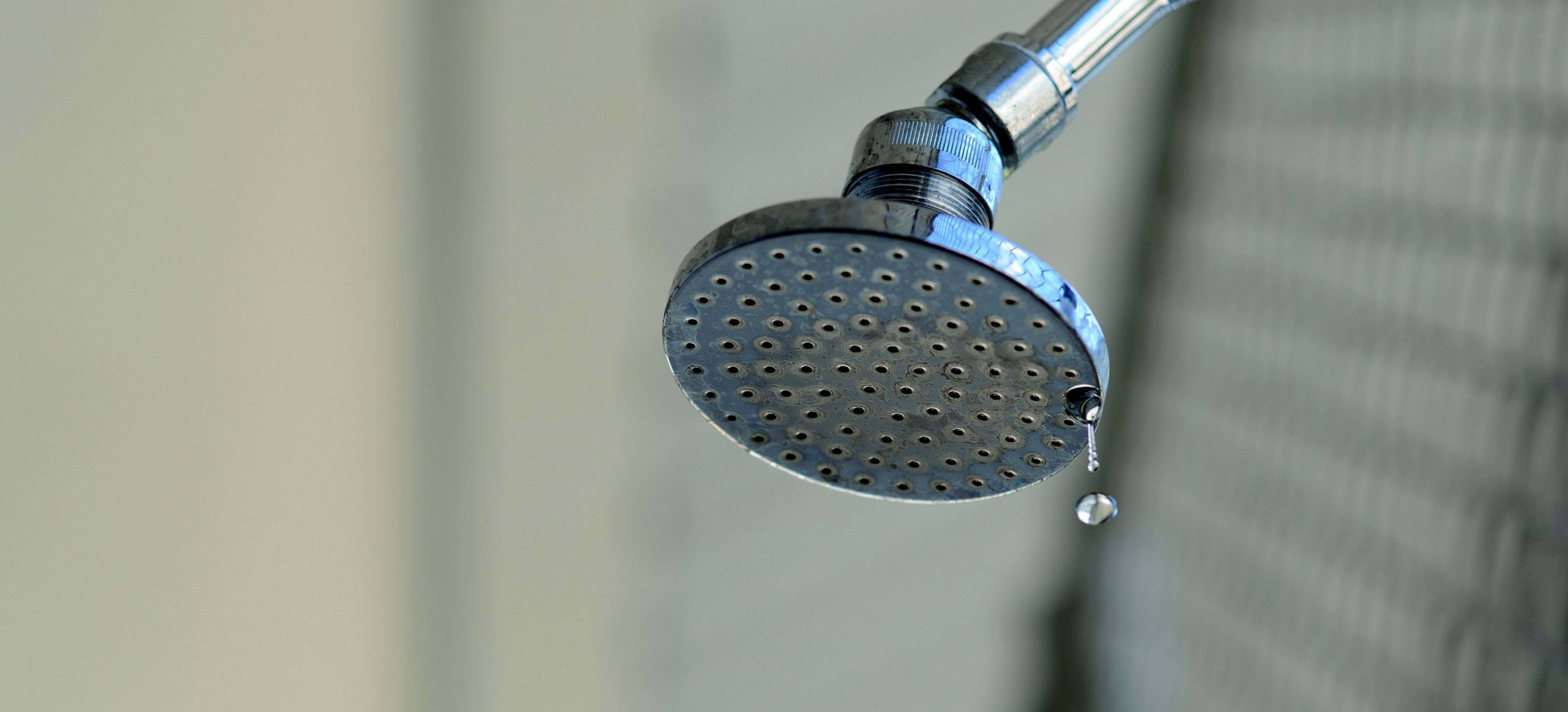Leaking Shower – Signs, Possible Causes, and How to Fix Them

Untreated shower leaks are not only annoying but also expensive to repair. Sometimes, you can easily repair the leak without professional help. However, you should know how to identify a problem that is beyond your plumbing skills. Implementing a temporary solution before the professional repair can save you from the serious consequences of a leaky shower.
So, if you:
- Think there’s a leak in your shower;
- Don’t know how to identify where it’s coming from;
- Want to avoid serious damage to your property.
Then this post is right for you! Keep on reading to find out why your shower is leaking.
Table of Contents
Signs of a Leaking Shower
Ignore water leaks for too long, and they can become a reason for serious property damage, so identifying the source of the leakage is the first step towards resolving it. That is why we recommend that you know how to check for leaks in your bathroom.
There are certain visible clues that can help you identify if your shower is leaking. Look around the house for the following signs:
- Detached tiles. Because the grout and adhesives that hold the tiles are constantly exposed to water, they might loosen up over time. This can cause the tiles to fall off.
- Mould and mildew. When the environment is wet and warm, there is a high chance of mould appearing in your bathroom. That usually happens because the water droplets from a leaking shower don’t dry and stay in the corners of your bathroom, creating perfect conditions for mould growth. The most common places for fungus growth are between tiles, grout, and caulked joints.
- Visible stains on the walls and floor. Depending on the location of your shower, you might spot blemishes on the walls and flooring. When your leakage isn’t that severe, water residue and rust are the most common types of stains that you may encounter. However, if the problem is much more serious, you might see the stains forming on the level of your home below the bathroom.
- Mouldy smell. Unfortunately, the mould is often hard to spot, but you can recognise it by the earthy smell. That is not a good sign, though, and it means that your leak is hidden and might require a lot of restoration.
Can a Leaking Shower Pose a Threat?
The level of danger depends on how much damage the leak is causing to the structure of your home, but this does not mean that you should leave the problem untreated until the last moment. Actually, a leaking shower should be fixed immediately to prevent emergencies and costly repairs. Light dripping leads to increased water bills and eventually results in more significant problems. The moisture accumulates in the walls – and this is where the trouble starts.
Penetrating the walls, water leaks will eventually reach the substructure that, most of the time, is not waterproof. Once the water reaches wooden structures, the building becomes susceptible to pest intrusion and rot. Water-damaged buildings, if untreated, can reach the point where they collapse.
Moreover, damp conditions in the substructure trigger mould growth that might pose a serious danger to your health. Some types of mould are toxic for people: throat soreness, irritation in the eyes, and allergic reactions are only some potential health issues.
As you can see, water damage from a leaking shower can be serious, so by treating it on time, you will avoid additional costs and protect your family from potential hazards.
Is it safe to use a leaking electric shower?
Long story short – no, it is not safe. It is a well-known fact that electricity and water are not compatible. If you notice any leaks in your electric shower, immediately turn off the power fuse and call professional plumbers, as DIY repairs can be quite dangerous, if you don’t know how the inner components of your electric shower function. Experts know how to handle shower leaks of any complexity, so you’re in safe hands.
Why is Your Shower Leaking and How to Fix it
Here we have described the most common causes of shower leaks and what you can do to fix them. Remember, some solutions require a certain degree of plumbing knowledge. Please, do not attempt any repairs, unless you are confident of your plumbing skills.
#1. Clogged or faulty showerhead
Prevention step: Opt for water softening plumbing if you want your pipes and bathroom fixtures to be clog-free.
The reason: If your shower head is leaking, there are two potential reasons causing it to drip: a limescale buildup or a faulty rubber washer – a circular rubber detail that insulates your showerhead.
The solution:
Here’s how to fix a leaking shower head:
Step 1. Detach the showerhead from the hose or the shower wall, depending on your shower type;
Step 2. Spray a limescale solution on the showerhead and let it sit to dissolve the water residue;
Step 3. After ten minutes, scrub it thoroughly with a cleaning brush;
Step 4. Rinse the showerhead well with water and let it fully dry;
Step 5. While the showerhead dries, check the conditions of the rubber washer;
Step 6. If you spot any damages like cracks or tears, replace it with a new one. You can easily find them in any hardware store;
Step 7. Place some adhesive tape on the threads of the connection for an additional seal;
Step 8. Assemble all the parts back together.
#2. Worn shower hose
The reason: Shower hoses are exposed to regular wear and tear. That is why you might need to change them from time to time.
The solution:
How to fix a leaking shower hose:
Step 1. Disconnect the old hose from the tap and remove the rubber washer. Keep the washer, as you will need to place it on the new hose, and if it’s damaged, get a new one;
Step 2. Detach the showerhead, and again remove the washer. You need two washers for two joints;
Step 3. Attach the new hose, with the washers placed on both sides, and hand-tighten them.
#3. Faulty shower mixer tap
The reason: Most of the time, the shower mixer tap leaks because of the worn rubber seal. You can find it between the neck and the spout of the mixer, and in order to fix this leak, you should replace the damaged seal ring.
The solution:
The 6 steps on how to fix a leaking shower bar mixer:
Step 1. Turn off both the hot and cold water supply, and drain the water that sits in the line;
Step 2. Remove the mixer spout;
Step 3. Locate the circular rubber seal inside the neck of the mixer;
Step 4. Take the seal out and replace it with a new one;
Step 5. Install the spout back to the mixer;
Step 6. Turn on the water supply and test the water flow.
#4. Worn shower valve
The reason: If you have tried changing the rubber seal, but it didn’t help, then the problem could be the shower valve. This is a part of the shower that sits behind the shower faucet and directs the hot and cold water to the showerhead. Over time, it gets damaged and clogs up by water residue.
The solution:
How to fix a leaking shower valve in 6 simple steps:
Step 1. Turn off the water supply;
Step 2. Take off the shower handle by removing a screw in the middle of it. Set it aside. With some handles, the screws are hidden under a plastic cap;
Step 3. Unscrew the trim plate that’s attached to the wall with two screws. As you remove it, you will see a hollow space and a valve itself;
Step 4. Remove a valve clip – a two-pronged metal part on top of the valve;
Step 5. Take the valve out. Don’t pull it too hard, as you risk breaking the water pipes. If the valve is hard to pull, spray some lubricant on;
Step 6. Change the valve and assemble everything back in the correct order.
#5. Cracked shower tiled surfaces
The reason: Sometimes, even the waterproof surfaces turn out to be the culprit behind a leak. As your tile grout cracks, the water gets between the tiles and eventually soaks into the surface behind or under them.
The solution:
Here’s how to fix a shower leaking trough tiles:
Step 1. Remove the old grout, and to make your job easier, use a grout saw;
Step 2. Once the grout is fully removed, wait for the area to dry. Make sure that the bathroom is well-ventilated;
Step 3. Apply new grout but better use one with low absorption rates. Sanded tile grout is the best choice in this case, as it not only has low absorption rates but is also resistant to breakage;
Step 4. When you have grouted your tiles, let the area fully dry once again;
Step 5 (optional). Apply a layer of sealer to prevent the shower from leakages.
#6. Faulty shower drain connections
The reason: When you are dealing with a leaking shower drain, you might not even notice until the leakage reaches the ceiling underneath the bathroom. The reasons might be many, but the most common one is weak drain connections.
The solution: The drains of showers or bathtubs are connected to a P-trap that prevents your sewer gases from going back into your drain and, at the same time, allows the wastewater to go down the sewer. If the P-trap hasn’t been installed correctly or has experienced some damages, it might cause a leak. In this case, if you can reach the P-trap, examine it for any damages and if you see any – seal them.
#7. Shower supply pipes issues
The reason: The pressure in the water supply pipes allows us to have a smooth water flow whenever we turn on a faucet. However, if the pipes are damaged or haven’t been installed correctly, the pressure creates a leak.
The solution: Most homes have pipelines in-between the building structures, therefore, access can be limited. If you are not completely sure that the water leak is coming from the main water supply pipes, run a simple test. Here is how to fix a leaking shower pipe:
- Turn off all the water supply in the house;
- Check your water meter dials that show litres;
- Compare the results in 2 hours. If the dials have moved over this time, then you have a leak in the water supply pipes.
Unfortunately, the repair of the water supply pipes can be quite dangerous for an inexperienced person. That is why we highly recommend entrusting the repairs to professional plumbers.
#8. Deteriorated seal of the shower tray and the shower tray waste pipe
The reason: Shower trays are usually water-resistant, however, when exposed to any movements, they might start letting the water pass to the surfaces below. The unfixed floorboards might cause the movements underneath the tray. Also, another reason could be a badly installed tray that moves when any pressure is applied.
Another cause is a faulty sealant, as you have a silicone sealant covering the spaces between your shower tray and tiles, it might start peeling off with time, allowing the water to enter the places it shouldn’t.
The solution:
So, if you’re wondering how to fix a leaking shower tray, here are some tips:
When the problem is in the sealant, you can easily fix the leak yourself. Simply peel off the defective sealant with a sharp knife, but be careful. Let the joints dry fully and apply an extra layer of sealant. Modern sealants have anti-bacterial and mould-resistant properties, so make sure you choose the best one, to prevent the leaks from reappearing.
However, if you assume that the source of a leak is in your shower tray waste pipe, then most likely you will have to remove it. To do so:
Step 1. Take off the first two rows of tiles. Shower trays are usually installed before the tiling, so it creates a tight connection that will not let the water in;
Step 2. Thoroughly examine the waste pipe for the sources of the leaks;
Step 3. Tighten up and seal the leaking joints of the tray waste pipe;
Step 4. Assemble the shower tray back. Don’t forget to level the tray with a spirit level.
Shower Keeps Leaking? Here’s What to Do!
Sometimes, our desires are limited by our skills, no matter how hard we want to handle a given situation, and that’s okay. There is nothing wrong with it, you can always ask for a helping hand because professional plumbers will be more than happy to help you. Spare yourself the trouble, call an expert to fix your leaking shower.
Leaking Shower – Signs, Possible Causes, and How to Fix Them
Need help? Hire the London Property Service experts today by giving us a call on 020 3078 5920.




